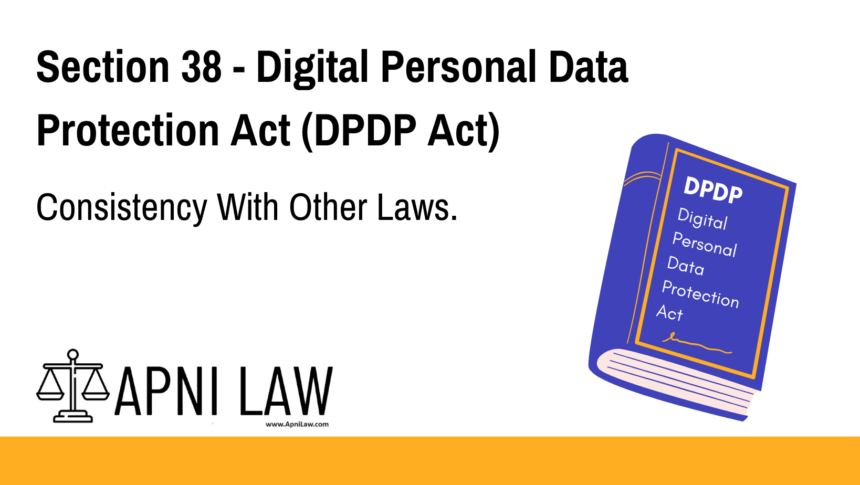Code: Section 38 DPDP Act
(1) The provisions of this Act shall be in addition to and not in derogation of any
other law for the time being in force.
(2) In the event of any conflict between a provision of this Act and a provision of any
other law for the time being in force, the provision of this Act shall prevail to the extent of
such conflict.
Explanation of Section 38 DPDP
Section 38 of the Digital Personal Data Protection Act (DPDP) establishes the relationship between this law and other existing laws. This section ensures that the DPDP Act supplements existing laws, meaning that it does not override or replace them unless there is a direct conflict between provisions.
Key Provisions:
- Additional to Existing Laws (Sub-section 1): The DPDP Act is meant to work alongside other laws that are currently in force. It does not nullify or invalidate any other laws but provides additional regulations focused on personal data protection.
- Prevailing in Case of Conflict (Sub-section 2): If there is a contradiction between the provisions of the DPDP Act and any other law, the provisions of the DPDP Act will take precedence to the extent of the conflict. This ensures clarity and prevents confusion between multiple legal frameworks.
Illustration
Example 1: Data Protection in the Banking Sector
The Banking Regulation Act, 1949, mandates specific rules about customer data, including how it should be stored and accessed. If there is a conflict between the rules established under this Act and the provisions of the DPDP Act, the DPDP Act will override the conflicting provisions. For example, if the DPDP Act imposes stricter rules on data storage, those rules will prevail over any conflicting provisions in the Banking Regulation Act.
Example 2: Personal Data in Health Sector
The Clinical Establishments Act governs the handling of health data by medical institutions. If a provision of the DPDP Act contradicts this Act, such as in terms of data sharing or consent requirements, the DPDP Act will take precedence in matters concerning personal data protection. The health sector would need to comply with the stricter data protection guidelines set by the DPDP Act.
Common Questions & Answers on Section 38 DPDP
1. Does the DPDP Act replace other laws?
- Answer: No, the DPDP Act is supplementary to existing laws. It adds to them but does not replace or annul any other law unless there is a direct conflict.
2. What happens if there is a conflict between the DPDP Act and another law?
- Answer: If there is a conflict, the provisions of the DPDP Act will prevail over any conflicting provisions of other laws.
3. How does this affect compliance with other laws?
- Answer: Organizations will need to ensure that they comply with both the DPDP Act and any other applicable laws. In cases of conflict, they must follow the DPDP Act’s provisions for personal data protection.
4. Can the DPDP Act be overridden by other laws?
- Answer: No, in case of conflict, the DPDP Act will prevail over conflicting provisions of other laws.
Conclusion
Section 38 of the Digital Personal Data Protection Act (DPDP) ensures that the DPDP Act complements existing laws without overriding them, except in cases of direct conflict. In the event of such a conflict, the DPDP Act’s provisions will take precedence. This promotes a clear legal framework for personal data protection in India.
For more information on the DPDP Act, visit ApniLaw, your trusted legal resource!








